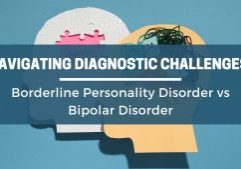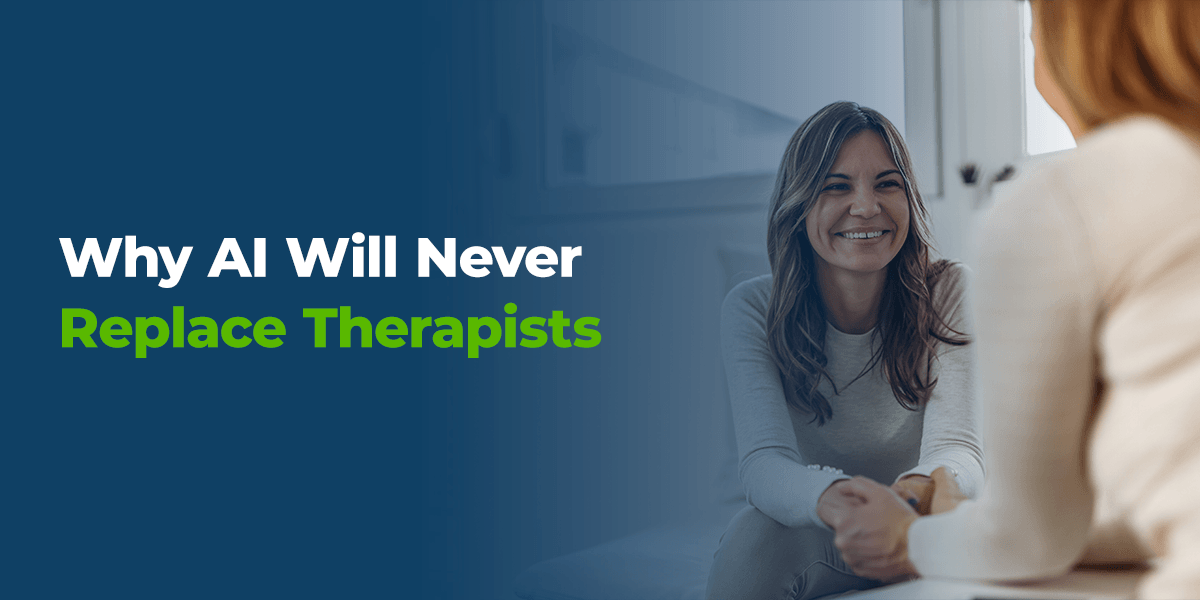
Why AI Will Never Replace Therapists
Artificial Intelligence (AI) is making remarkable strides in a number of fields, including healthcare to hospitality services. We as humans are a little threatened by all the things that AI can do and are naturally curious whether artificial intelligence will one day replace us in mental health professionals.
While AI has many strengths, it can never replicate or replace the human element in the therapeutic process. In this blog, we'll explore why AI will never replace therapists and delve further into the indispensable role therapists, psychiatrists and all mental health professionals have in the betterment of individuals' mental health.
The Role of Chatbots in Therapy
The rise of AI therapists like Woebot and Wysa has sparked controversy among mental health professionals, and for good reason. Some see these bots as a solution to the nationwide clinician shortage, while others worry they could spell the end of traditional psychotherapy.
Can AI Be Used as a Therapist?
In theory, a therapy chatbot can act as a virtual therapist by conversing with patients and asking them questions about their experiences and feelings. They can even provide recommendations for exercises patients can do outside of the conversation.
On the one hand, these applications could fill a very real void for those who lack access to quality psychological care. On the other, though, they can't provide the same kind of connection a human therapist can — and when the U.S. Surgeon General declares loneliness a public health crisis, it becomes clear that chatting with a computer won't meet that need.
The Impact of AI on the Profession of Therapy
Although AI cannot replicate a live therapist, it does have some strengths that help enhance their practices. One of AI's biggest advantages is its ability to rapidly analyze massive quantities of data, which lets it identify patterns humans might miss. Therapists can use this capability to empower their practice in the following ways:
- Analyzing patient speech and writing for signs of distress using natural language processing (NLP)
- Helping psychiatrists select the right medications based on patient data
- Identifying potential areas of improvement for trainees and students
- Directing patients to crisis resources outside office hours
- Evaluating therapist performance and providing recommendations for future sessions
- Translating conversations in real-time to provide aid to people who speak English as a second language
Ultimately, the key is to find ways this technology can improve therapeutic techniques instead of taking the therapist out of the picture completely.
Instant Webinar
Growing Your Mental Health Practice with AI
Join us for an enlightening webinar where we'll explore innovative strategies for growing your mental health practice through the power of artificial intelligence (AI) in digital marketing.
In this webinar, we'll uncover the potential of AI-driven marketing to enhance your outreach, engage with your audience, and ultimately get more clients for your practice.
What You'll Learn:
- How to Use AI to Get More Clients
- Maximizing ChatGPT for Your Practice
- Using AI to Enhance Social Media Marketing
- Creating AI Outlines for Content Creation
- Tools and Platforms for Marketing Automation
The Limitations of AI in Understanding Human Emotions
While AI chatbots can use language that sounds empathetic, they are still machines — they literally cannot put themselves in other people's shoes, which is critical for understanding where a patient is coming from. This lack can cause the AI to generate responses that don't align with the patient's needs, instead pushing for treatments that the patient isn't yet ready for.
Why AI Can't Mimic the Empathy of Therapists
At the heart of therapeutic practice, regardless of the mental health professional, lies the profound significance of the emotional connection between the practitioner and their clients. Mental health professionals like therapists bring to the table an abundance of authentic empathy, unwavering compassion and profound understanding that extends beyond mere data analysis.
Although AI systems can attempt to simulate empathy, they ultimately fail to replicate the genuine emotional comprehension that grows out of shared human experiences nurtured by compassionate therapists and mental health providers. AI will not be able to have individuals reveal their deepest emotions, fears and vulnerabilities in a safe therapeutic space. AI will never be able to give a hug, share tears or hold the hand of a client in need.
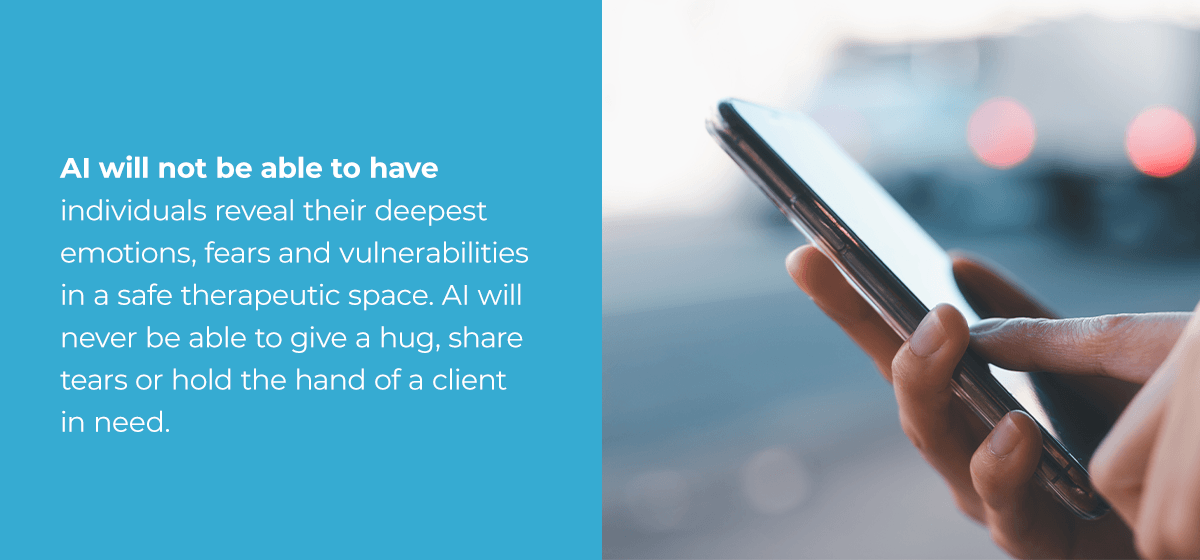
The Inability of AI to Understand Human Nuance
Most generative AI programs rely on existing data sets, which can cause them to miss subtle details about a patient's personality or condition. For example, while a chatbot could be useful in providing crisis care outside of regular work hours, most bots aren't sophisticated enough to properly identify when a patient is in crisis.
Here's another example. Recently, the National Eating Disorder Association (NEDA) attempted to replace its prevention helpline with Tessa, an AI chatbot designed to aid people struggling with eating disorders. Instead of providing users with helpful resources, Tessa dispensed triggering weight loss advice that could have had serious consequences.
Nonverbal Communication and Body Language
Nonverbal communication — body language, tone of voice, and facial expressions — makes up 93% of human interaction, according to a groundbreaking study by Albert Mehrabian. Professionals in the mental health field are trained to spot these subtle cues, which can greatly assist in assessing a client's emotional state. The lack of ability to comprehend nonverbal cues makes AI ineffective.
The Importance of the Human Experience in Therapy
Real psychotherapy relies on human interaction. The therapist uses their skills to gain a complete understanding of what the patient is going through, while the patient benefits from the therapist's support and questioning.
Many AI chatbots are capable of sustaining a long conversation and asking relevant follow-up questions, but they can't really understand what a patient is talking about. While that's enough for people who just want to be heard, anyone seeking real clinical treatment is at a disadvantage.
The Therapist-Patient Relationship: A Barrier for AI
There is substantial evidence that a strong relationship between the patient and therapist is a critical component of effective treatment.
Because it's a machine, an AI therapist can't bond with a patient the same way a human might. The patient might feel trust toward the AI, but at the end of the day, the interaction is completely one-sided — which is detrimental to real growth.
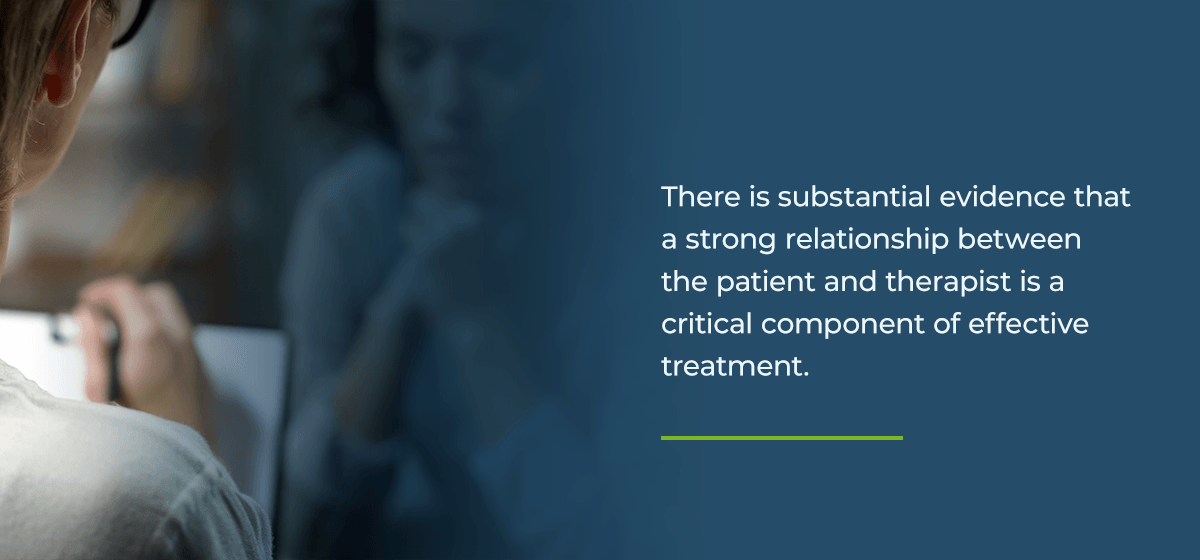
Personalized and Tailored Treatment
Individuals are unique, and their therapy needs are equally diverse. In order to meet the specific needs of each client, therapists adapt their approach, giving the client what they need in order to better their mental health. They consider the client's background, experiences and emotions, creating a personalized treatment plan.
As opposed to human emotions and experiences, artificial intelligence relies on algorithms and data patterns. These analyses can generate valuable insights, but you need human creativity to adapt those insights into a real-life plan.
Dynamic Adaptation
As clients progress through treatment, their needs naturally change — that's why therapists adapt their approach over time. They can change strategies, interventions and techniques to suit the evolving situation.
Most AI systems use predefined algorithms and responses, thereby lacking the flexibility and intuition of human therapists.
The Ethical Implications of AI in Therapy
Like any new therapeutic technique, AI therapy brings with it a host of ethical and moral questions. What is the technology's potential for harm? Do therapist AI tools consistently adhere to HIPAA and other healthcare quality and privacy standards? There still isn't enough data to say for certain.
Although the FDA has designated patient-facing mental health tech tools like AI chatbots as “low-risk,” AI has a long way to go before it can provide the kind of ethical treatment patients need.
Bias and Discrimination
There's also a real concern about AI showing bias toward certain groups due to neglect on the part of the developers. Failure to train AI on diverse data sets can result in an algorithm that excludes marginalized racial, sexual and religious groups — which can potentially cause more harm than good when interacting with those populations.
For example, implicit discrimination is one of the biggest barriers marginalized groups face when seeking mental health treatments. Providers who fail to account for intersectionality and intergenerational trauma can accidentally subject their patients to microaggressions and harmful stereotypes, which can interfere with treatment. However, with proper education and training, the human therapist can realize when they've made a mistake and apologize.
Take that situation and replace the human therapist with an unfeeling bot that only has biased data to inform its responses. While a human therapist has the potential to do harm, a bot can't really apologize for its actions, which can further alienate the patient.
Lack of Ethical and Moral Judgment
The mental health field is not black or white but rather filled with gray areas. AI does not understand gray, it is only logical, not emotional. Clients often seek therapy to navigate complex moral and ethical dilemmas. As mental health professionals, we provide guidance based on our professional training and ethical principles. When dealing with sensitive matters, AI lacks the moral and ethical judgment humans possess.
Inability to Build Therapeutic Rapport
Trust and rapport are essential to a working therapeutic relationship between mental health professionals and their clients. This bond of trust is built on a foundation of reliability, consistency, and unwavering commitment to the client's well-being — and it can take weeks, months or even years for that foundation to develop. Clients can confide in their therapists without the fear of judgment or breach of confidentiality, knowing that their best interests are at the forefront of the therapeutic journey.
When a client fully trusts their clinician and builds excellent rapport, they can be completely open and vulnerable with them. AI, being algorithm-based, doesn't possess the capacity to develop this kind of trust and rapport, and it lacks the depth of human connection or ability to offer a comforting presence.
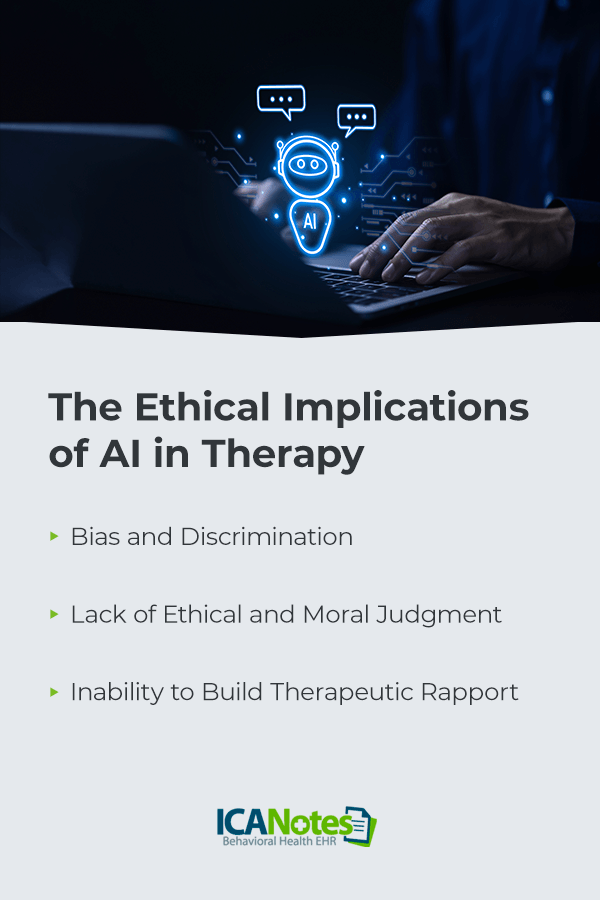
Final Thoughts: Will AI Replace Therapists?
Although AI has made significant gains in various fields, it can never truly replicate the unique qualities of clinicians, such as empathy, emotional connection, adaptability and ethical judgment. So, while AI can be a valuable tool in a therapist's everyday workflow, it can never fully replace the vital role that therapists play in helping individuals heal, grow and thrive.
The human element of therapy is irreplaceable and essential in promoting emotional and psychological well-being. Ultimately, computer programs can never replace real therapists — there's nothing to fear.
About ICANotes
At ICANotes, our mission is to help mental health professionals deliver the highest-quality care. That's why we designed an EHR solution specifically for the behavioral health field — you can record better notes in less time so you can put all your focus into talking with your patient.
Learn more about us and our solution on our website.
Start Your Free Trial Today







